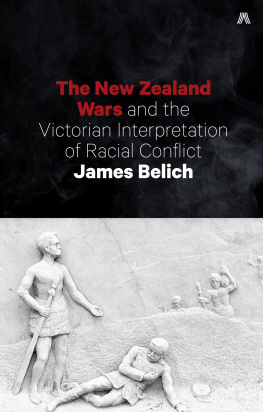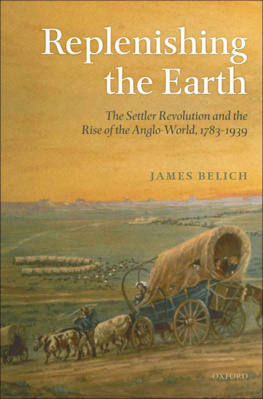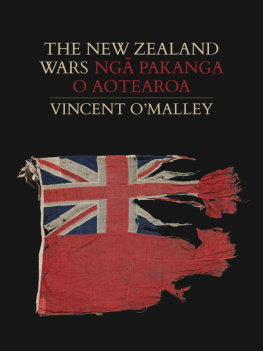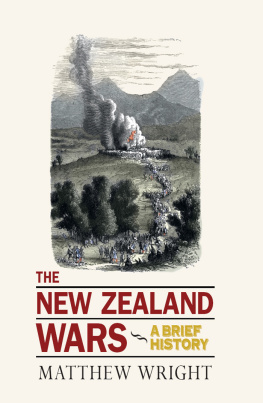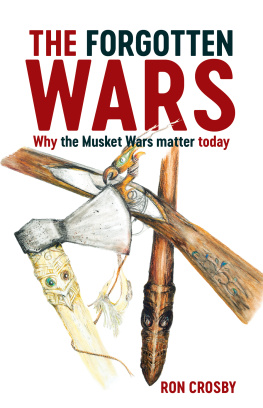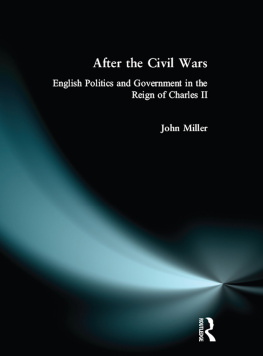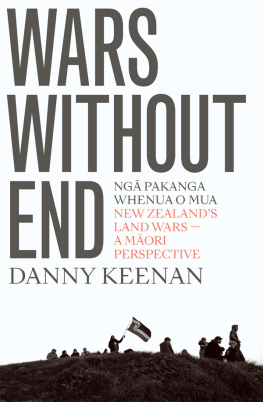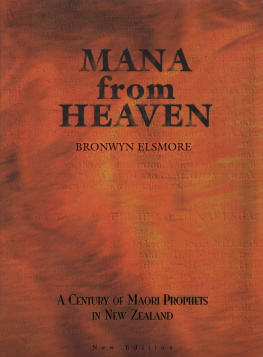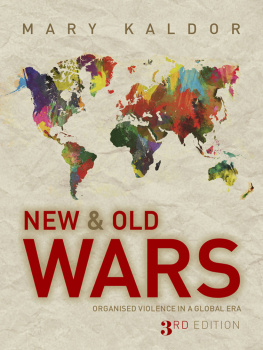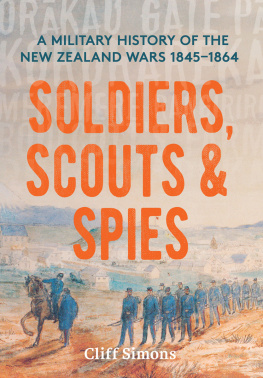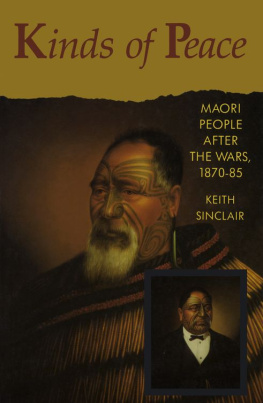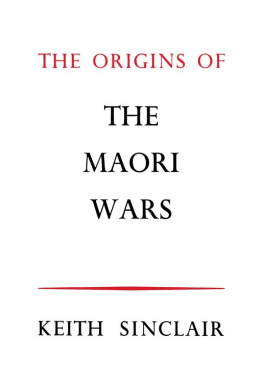James Belich - New Zealand Wars and the Victorian Interpretation of Racial Conflict
Here you can read online James Belich - New Zealand Wars and the Victorian Interpretation of Racial Conflict full text of the book (entire story) in english for free. Download pdf and epub, get meaning, cover and reviews about this ebook. year: 1988, publisher: Penguin Books (NZ), genre: History. Description of the work, (preface) as well as reviews are available. Best literature library LitArk.com created for fans of good reading and offers a wide selection of genres:
Romance novel
Science fiction
Adventure
Detective
Science
History
Home and family
Prose
Art
Politics
Computer
Non-fiction
Religion
Business
Children
Humor
Choose a favorite category and find really read worthwhile books. Enjoy immersion in the world of imagination, feel the emotions of the characters or learn something new for yourself, make an fascinating discovery.
- Book:New Zealand Wars and the Victorian Interpretation of Racial Conflict
- Author:
- Publisher:Penguin Books (NZ)
- Genre:
- Year:1988
- Rating:3 / 5
- Favourites:Add to favourites
- Your mark:
- 60
- 1
- 2
- 3
- 4
- 5
New Zealand Wars and the Victorian Interpretation of Racial Conflict: summary, description and annotation
We offer to read an annotation, description, summary or preface (depends on what the author of the book "New Zealand Wars and the Victorian Interpretation of Racial Conflict" wrote himself). If you haven't found the necessary information about the book — write in the comments, we will try to find it.
New Zealand Wars and the Victorian Interpretation of Racial Conflict — read online for free the complete book (whole text) full work
Below is the text of the book, divided by pages. System saving the place of the last page read, allows you to conveniently read the book "New Zealand Wars and the Victorian Interpretation of Racial Conflict" online for free, without having to search again every time where you left off. Put a bookmark, and you can go to the page where you finished reading at any time.
Font size:
Interval:
Bookmark:
To the Memory of Ivan Petar Anzulovi
SKETCH MAPS
SketchmapsdrawnbyR.M.Harris
I would like to thank the staff of the various libraries and archives used in my research, especially those of small institutions such as the Wanganui and Taranaki Museums, who could not have been more helpful despite their limited resources. I also gratefully acknowledge grants toward research expenses from Nuffield College, Oxford, the Beit Trust, and, in particular, the Auckland University Research Committee, whose generosity enabled me to complete my research.
Many of my teachers, students, and colleagues at Wellington, Oxford, and Auckland Universities contributed to the thinking behind this book. I am grateful to them all, especially the following: Mary Boyd, Miles Fairburn, and Peter Webster of Victoria University of Wellington; Judith Binney, Keith Sorrenson, Ranginui Walker, and Keith Sinclair of Auckland University; Colin Davis and John Owens of Massey University; Frederick Madden and Ronald Robinson of Oxford University; Alan Ward of La Trobe University; Michael Hoare of Wellington; Ray Rakatau and Kahu Samuels of Ngati Haua. I owe a special debt to David Fieldhouse, now of Jesus College, Cambridge, who supervised the original D.Phil, thesis with patience, kindness, and skill. The advice of these scholars was greatly appreciated, but it was not always followed, and I remain responsible for the views expressed in this book.
I would also like to thank Dennis McEldowney and Robin Dudding, of Auckland University Press, for their editorial expertise, and Zena Huxley, Carol England, Jenny Barrett, and Gwyn Callan for their efforts in typing the manuscript. I am deeply grateful to my friends, who sustained me through good times and bad in Britain and New Zealand, and to my family, especially my father, Jim Belich, whose support was infinite. Above all, I thank my wife Margaret. Without her help, encouragement, and acute advice this book would not have been written.
James Belich
Wellington, 1985
THIS IS A BOOK ABOUT NEW ZEALANDS GREAT CIVIL WAR, the grand clash of its two peoples, Maori and Pakeha. While minor errors were corrected for the 1998 paperback edition, developments in my thinking since first publication in 1986 have not been incorporated into the book. My reasons are, first, that these developments are consistent with the main lines of The New Zealand Wars, and have been set out in the subsequent books I Shall Not Die: Titokowarus War (1989) and Making Peoples: A History of the New Zealanders (1996). Second, I do not feel that my interpretation of the wars and their myths has yet been substantially undermined by other historians or by new evidence. Third, all books are works of their time, and to pretend otherwise by comprehensively revising them is not always a good idea. The New Zealand Wars was substantially written in 198084, when I was in my mid-twenties. It is, in some respects, a young mans book. It was perhaps a little too eager to prove predecessors wrong, and it had over-ambitious aims: to reshape understandings of MaoriPakeha conflict and of colonial warfare in general. It fell short of the latter objective, but it has had some impact overseas. It was published in a North American edition, and used, for example, in general works on popular imperialism and tribal warfare, and specialist works on Indian sepoys and Australian military history. I take pride in having persuaded at least a few overseas scholars to give New Zealand history its due. I take still more pride in the fact that, in New Zealand, the books readership has gone beyond the fewsurprisingly far for an academic work which unashamedly confronts complexity. The book has not only stayed in print for almost three decades, but also provided the base for a television documentary seriesan almost unimaginable fate for something which began life as a doctoral thesis. The television series may be the pudding: the book remains the proof.
THIS BOOK IS A REVISIONIST STUDY OF THE NEW ZEALAND WARS of 184572. It is undertaken partly for its own sake, but also in the pursuit of two themes of wider importance. The first, indicated by the New Zealand Wars part of the books title, concerns the major military events, their underlying nature, and their impact on New Zealand history. The second, The Victorian Interpretation of Racial Conflict, concerns the contemporary record of these events, and its implications for comparable conflicts.
The first theme stems from a widespread problem in the history of war. The problem is not simply one of neglect, but of the isolation of military history, of its separation from the mainstream of historical scholarship. This is as much the responsibility of those who have practised military history as of those who have not. The aim of the former has often been, in Michael Howards words, didactic and normative, and teaching people how to fight better does not necessarily make for good histories of fighting, or for historical, as against military, revisionism. The approach of campaign history tends to be narrow, to implicitly deny that war is part of history as a whole, interwoven with politics and economics, society and culture, to form a single fabric. On the other hand, professional historians tend to avoid military history, partly on the principle that to study war is to advocate it. This is an ostrich-approach to the malaise of war, as irrational as it is persistent.
A number of historians have noted this, and some have also discerned a trend towards a new history of warfare. There is, perhaps, a tendency to see the new themes in the history of war as alternatives to the study of campaigns, rather than its necessary partners. Keegan cautions us against this throwing-out of the baby with the bathwater. We still want to know who won, how, and to what degree, and, like war itself, these questions are too important to be left to generals.
Possibly, as far as some European wars are concerned, these questions Here, a reliable and extensive base of modern conventional military histories, founded on primary research, rarely exists. In the study of colonial warfare, therefore, the re-evaluation of campaigns a revisionist old military historymust proceed hand-in-hand with an approach more akin to the new military history, one which recognizes war as an interacting part of the historical totality. To understand the social and cultural history of warand the effect of war on social and cultural history, which is rather differentwe must first know what happened, how, and why.
These considerations dictate the character and limitations of the military analysis in this book. On the one hand, like the old military history it focuses on battle, on the questions of who won, how, and to what degreefor, in many wars, winning is a matter of degree. Since the secondary literature on the New Zealand Wars often simply perpetuates inherited assumptions, even the most basic conclusionsthat the British won a particular war for examplecannot be accepted merely because a dozen books draw them. Revision must proceed from the ground up. On the other hand, like the new military history, the analysis also seeks to place the events as revised in their contextsin their military context, as part of the competition between two systems of war, and in their non-military context, as part of the broad sweep of New Zealand history, and particularly of race relations history.
But human conflict does not decline in complexity as it does in scale and, within the present limits of space, neither objective can be fully achieved. The revisionist old military history approach does not produce a comprehensive narrative but concentrates on the four major wars and their major military events, to the exclusion of lesser operations. The small size of wars is too readily equated with insignificance, and it is not suggested that such operations were unimportant, but simply that they were less important . Nor does the new military history approach go as far as one could wish. The anthropology of warlike organizations, the social history of war, and the human face of battle are touched on all too lightly. This book can only be a first step towards integrating the story of the most important conflict fought in New Zealand into the story of the country as a whole.
Font size:
Interval:
Bookmark:
Similar books «New Zealand Wars and the Victorian Interpretation of Racial Conflict»
Look at similar books to New Zealand Wars and the Victorian Interpretation of Racial Conflict. We have selected literature similar in name and meaning in the hope of providing readers with more options to find new, interesting, not yet read works.
Discussion, reviews of the book New Zealand Wars and the Victorian Interpretation of Racial Conflict and just readers' own opinions. Leave your comments, write what you think about the work, its meaning or the main characters. Specify what exactly you liked and what you didn't like, and why you think so.

